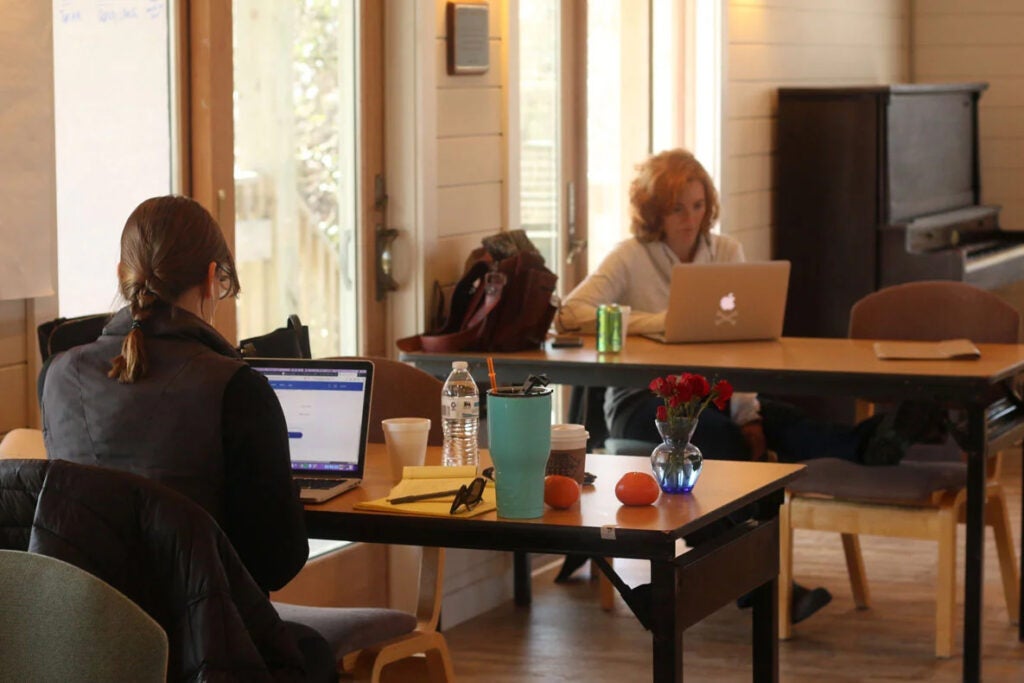Writing Accountability Groups
 Writing Accountability Groups (WAGs) are small groups of 4-9 individuals who meet once a week to write, set goals, and achieve them, by establishing productive writing habits, sharing with others, and holding one another accountable.
Writing Accountability Groups (WAGs) are small groups of 4-9 individuals who meet once a week to write, set goals, and achieve them, by establishing productive writing habits, sharing with others, and holding one another accountable.
Kerri Flinchbaugh, assistant director of the University Writing Program and a professional writing consultant at the Laupus Health Sciences Library, said WAGs allow writers to work toward a sense of control over their writing process and practice, learn how other writers approach specific writing challenges, commit to scheduled weekly writing sessions, gain access to an editor for individualized support, and connect with other writers.
As a new faculty member at ECU, and after an encouraging experience with a writing accountability group, Dr. Courtney Baker, assistant professor of psychology, discussed starting a WAG at ECU. Currently, she is the leader of ECU’s early career faculty WAG.
“Based on our conversation, I really thought early career faculty, who understand all the hats we juggle, could use a place to hold each other accountable. It is easy to put your own writing on the back burner, but WAGs allow you the space to ensure that doesn’t happen,” she said. “This speaks to my beliefs on the effectiveness of WAGs here at ECU. I have even created a smaller version of a WAG as part of my graduate student research lab. WAGs help make it easier to hold yourself accountable to get your writing done, especially when you know others are interested in hearing how you progress. These groups can also be a sounding board of other writers who might provide advice on issues we face as we write. Finally, having a meeting makes it easier to ensure your writing is scheduled, which is often half the battle of getting the writing completed.”
Dr. Tisha Emerson, professor and chair of the Department of Economics, also is familiar with WAGs and the literature that highlights their benefits, including “Writing Accountability Groups (WAGs): A Tool to Help Junior Faculty Members Build Sustainable Writing Habits” and “Faculty Writing Groups: A Support for Women Balancing Family and Career on the Academic Tightrope,” among others.
Last year, Emerson participated in a WAG while still at her previous institution, Baylor University, and now participates in one at ECU. The group at Baylor was originally developed to help female associate professors gain promotion to the rank of full professor. Then they were expanded to include female assistant professors, and last year, to female full professors.
“After encouraging many others to participate and hearing glowing evaluations, I felt that I should participate when a writing group for full professors was organized last year. Additionally, there is literature in economics that provides evidence of the value of commitment devices and accountability mechanisms (Nudge is a good example),” Emerson said. “Nonetheless, I was skeptical – but I had a great experience. In addition to participating in in-person writing groups, I’ve also participated in the virtual NCFDD’s 14-day writing challenge to considerable success. I’ve written book chapters, paper drafts, analyzed data, revised papers, read literature and prepared presentations.”
“I find that the discipline of scheduling time – and protecting that time – is critical to my productivity. Meeting with others (or for the online writing challenge, publicly reporting my productivity daily) helps me protect my scholarly time and not allow other demands (teaching, service, administration) to crowd out my research,” she said.
If joining a WAG at ECU sounds interesting to you, Flinchbaugh is accepting online applications for spring 2024 writing accountability groups. For additional information about assistance for writing and WAGs, visit the Writing Across the Curriculum website, or email Flinchbaugh at flinchbaughk@ecu.edu.